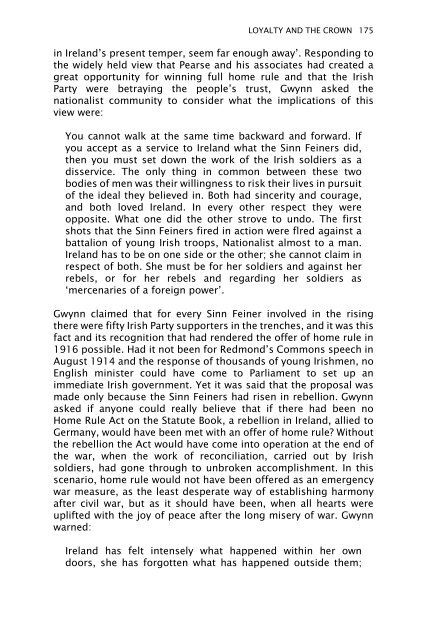Dividing Ireland: World War I and Partition
Dividing Ireland: World War I and Partition
Dividing Ireland: World War I and Partition
You also want an ePaper? Increase the reach of your titles
YUMPU automatically turns print PDFs into web optimized ePapers that Google loves.
LOYALTY AND THE CROWN 175<br />
in <strong>Irel<strong>and</strong></strong>’s present temper, seem far enough away’. Responding to<br />
the widely held view that Pearse <strong>and</strong> his associates had created a<br />
great opportunity for winning full home rule <strong>and</strong> that the Irish<br />
Party were betraying the people’s trust, Gwynn asked the<br />
nationalist community to consider what the implications of this<br />
view were:<br />
You cannot walk at the same time backward <strong>and</strong> forward. If<br />
you accept as a service to <strong>Irel<strong>and</strong></strong> what the Sinn Feiners did,<br />
then you must set down the work of the Irish soldiers as a<br />
disservice. The only thing in common between these two<br />
bodies of men was their willingness to risk their lives in pursuit<br />
of the ideal they believed in. Both had sincerity <strong>and</strong> courage,<br />
<strong>and</strong> both loved <strong>Irel<strong>and</strong></strong>. In every other respect they were<br />
opposite. What one did the other strove to undo. The first<br />
shots that the Sinn Feiners fired in action were flred against a<br />
battalion of young Irish troops, Nationalist almost to a man.<br />
<strong>Irel<strong>and</strong></strong> has to be on one side or the other; she cannot claim in<br />
respect of both. She must be for her soldiers <strong>and</strong> against her<br />
rebels, or for her rebels <strong>and</strong> regarding her soldiers as<br />
‘mercenaries of a foreign power’.<br />
Gwynn claimed that for every Sinn Feiner involved in the rising<br />
there were fifty Irish Party supporters in the trenches, <strong>and</strong> it was this<br />
fact <strong>and</strong> its recognition that had rendered the offer of home rule in<br />
1916 possible. Had it not been for Redmond’s Commons speech in<br />
August 1914 <strong>and</strong> the response of thous<strong>and</strong>s of young Irishmen, no<br />
English minister could have come to Parliament to set up an<br />
immediate Irish government. Yet it was said that the proposal was<br />
made only because the Sinn Feiners had risen in rebellion. Gwynn<br />
asked if anyone could really believe that if there had been no<br />
Home Rule Act on the Statute Book, a rebellion in <strong>Irel<strong>and</strong></strong>, allied to<br />
Germany, would have been met with an offer of home rule? Without<br />
the rebellion the Act would have come into operation at the end of<br />
the war, when the work of reconciliation, carried out by Irish<br />
soldiers, had gone through to unbroken accomplishment. In this<br />
scenario, home rule would not have been offered as an emergency<br />
war measure, as the least desperate way of establishing harmony<br />
after civil war, but as it should have been, when all hearts were<br />
uplifted with the joy of peace after the long misery of war. Gwynn<br />
warned:<br />
<strong>Irel<strong>and</strong></strong> has felt intensely what happened within her own<br />
doors, she has forgotten what has happened outside them;








